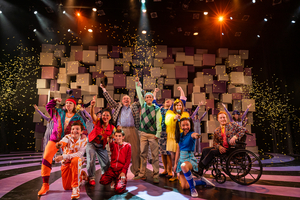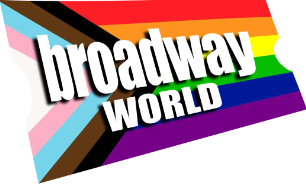Review: ROALD DAHL'S WILLY WONKA at Wheelock Family Theatre

Roald Dahl wrote books for the children of his time and it is a wonder that many of his creations have remained as popular and well-loved as they have decades after his death. Although James and the Giant Peach, Matilda, The Witches, and The Twits can all trace thematic influence back to Dahl's involvement in World War II, Charlie and the Chocolate Factory seems to be the most heavily-informed by an unquestioning devotion to western industrialization and hope for the germinating seeds of our present-day capitalism. The 1971 movie, Willy Wonka and the Chocolate Factory is indicative of its time not only in its psychedelic colors and film effects but in its Vietnam-Conflict-era praise of Americanized consumerism. While Tim Burton's 2005 film adaptation reclaimed the title of the 1964 book and attempted to be a more faithful translation, its darkness and sterile settings have not garnered the cultural embrace of its predecessor, mainly because (I believe) of the public's common, shifting relationship with and disdain for industrialization and capitalism. (I refer generally to a shifting attitude of the public, as the book met with a successful campaign from the NAACP in 1970 championing rewrites that would eliminate the story's pro-slave-labor undertones, indicating that even upon publication, it was met with some disdain.)
Roald Dahl's Willy Wonka at Boston University's Wheelock Family Theatre suffers from the same ailment as the 2005 film, a dated source material that does not have the same power to optimistically capture audiences' imaginations as it once did. It may seem presumptuous and superior to begin a critique of a children's show with such an analysis, but I feel strongly that the mentions of poverty, hunger, unemployment, and financial stress early on in the show resonated more deeply with an audience of children at a school matinee than any of the marvels of a candy factory could later rectify. We follow Charlie Bucket's journey from a poor boy whose family subsists on cabbage soup to the owner of the eponymous chocolate factory and ostensibly a long and prosperous life of wealth.
The first act of the show, with a book by Leslie Bricusse and Timothy Allen McDonald, almost entirely centers around exposition depicting how miserable the Bucket family's life is, but how they find joy despite their hardships. Riddled with belabored sequences of second-rate wordplay in which Charlie's aging grandparents mishear each other, the first act is a tough sell for the sold-out elementary school crowd. By the third time a joke was made mistaking the phrase "bar of candy" for "jar of brandy", I found myself jealous of the two trouble-making boys behind me, whose teacher had suggested they do jumping-jacks quietly at the back of the theatre to get their silliness out. If only polite company did not prohibit me from joining.
The script does a disservice to Dahl's understanding of young audiences. The author famously spoke about killing the parents of the main character early on in order to captivate scores of children through delicious fear. In his book, mystique and intrigue surround the much-lauded character of Willy Wonka and he is not introduced to the audience until he is met by Charlie, allowing us to revel in our anticipation of this man whose factory can be smelled from far outside of its gates. In this adaptation, Wonka steps out in front of the main rag at the top of the show without an overture or even a blast of trumpets, introducing himself as the narrator. His entrance is not met with any audible excitement from a crowd of young people who just squealed with delight when the house lights lowered (the entire audience was excused from school to be here, we are ready to cheer at even the simplest stimuli). From there, the red curtain parts, revealing a stunning sculpture of white and purple cardboard boxes designed by Jimmy Rotondo, an MFA candidate at Boston University. Rotondo's set, upon being unveiled, earns its shouts of approval from the audience, however, this early moment marks the final eruption of bliss from the crowd. Never again are our imaginations captured so successfully nor is the visual world transformed so engagingly (much to the dismay of the disciplinarians in the crowd, there is little else to focus on moving forward, and to my personal dismay, little to distract my mind from wandering back to the forthcoming ticket I am dreading on my illegally parked car).
Though Rotondo's set is dramatically imposing, fellow BU MFA candidate, Matt Robson's lighting design does it no favors, washing the stage in pools of light without any sense of space or atmosphere. Director Emily Ranii, (Wheelock's Artistic Director, and one of my favorite Boston directors since Bridge Repertory Theatre's Mrs. Packard) explains in her program note how a child's imagination can transform a cardboard box into anything they want. While this may be true, this overarching idea traps us in a redundantly-recycled world in which it seems we cannot escape cardboard boxes. The child within me felt an alternating sense of disappointment that each new, exciting element was again being represented by a cardboard box and a sense of condescension, as though the un-dynamic images on stage were the fault of shortcomings within my own imagination. Children can be amazingly perceptive of representational theatre, but we as theatre artists must meet them halfway, bringing boxes to life in ways that spark ideas within our audiences as opposed to leaving them sitting on a stage and calling them an elevator. Though possibly unintentionally, the boxes evoke a sense of a warehouse, and the operative word in the book's title seems to become 'factory' instead of 'chocolate', and rather than suggesting Santa's Workshop, we are in Stoughton's Amazon Fulfillment Center.
The cast has many stand-out performances, mainly among the child actors. Michael Mansour as Augustus Gloop (reinvented from the obese, aryan character into a frenetic, competitive eater) is a big crowd pleaser with the cards stacked in his favor-- costume designer Chelsea Kerl has dressed him in an enviable track suit with a pizza design on it, and his mother is played to delightful comedic effect by Lisa Joyce who seems to have a sixth sense for making children laugh. Lily Park as Violet Beauregard is a powerhouse singer with excellent natural charm and Leo Ruckenstein as Mike TeaVee delivers a screwy, unhinged media-maniac with vocal agility and clarity beyond his years. Unfortunately, against a zany, stylized world of the children and their parents, Ricardo Holguin's Wonka feels undefined, uncommitted, and forgettable. An ensemble of children play the Oompa-Loompas, whose colonial backstory has been mercifully scrapped and we, as an audience, can choose to believe that they exist like the people in the Honey Bunches of Oats commercials, merrily working in a factory all day.
The production holds up a weak script as best it can. Certainly an opportunity to present children with an exciting style of theatre that deviates from the oversaturated projection designs of a national tour. A few excellent moments of storytelling transform simple platforms into a giant boat and lead an inventive tour of the many rooms in the factory. Russell Garrett's show choir choreography is clean and appropriately mechanical. Ultimately, I left happy (I did not get a ticket on my car).
Ticket information here.
Comments
Videos
